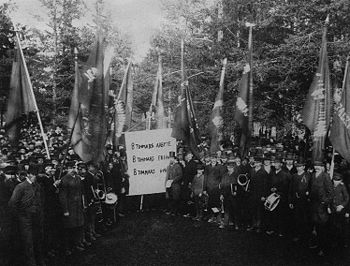
Swedish labour movement
Encyclopedia

Sweden
Sweden , officially the Kingdom of Sweden , is a Nordic country on the Scandinavian Peninsula in Northern Europe. Sweden borders with Norway and Finland and is connected to Denmark by a bridge-tunnel across the Öresund....
workers initiated the organizing of previously spontaneous food riot
Food riot
Food and bread riots are caused by harvest failures, incompetent food storage, hoarding, poisoning of food, or attacks by pests like locusts. When the public becomes too desperate in such conditions, they attack shops, farms, homes, or government buildings to attain bread or other staple foods like...
s into strikes
Strike action
Strike action, also called labour strike, on strike, greve , or simply strike, is a work stoppage caused by the mass refusal of employees to work. A strike usually takes place in response to employee grievances. Strikes became important during the industrial revolution, when mass labour became...
, hence acting as an autonomous group. Modern types av labour unions emerged in the 1870's. An event that is usually considered to be central in the early days of the Swedish labour movement is the lecture "Hvad vil Social-Demokraterna?" ("What do the Social Democrats want?") by August Palm
August Palm
August Teodor Palm was a Swedish socialist activist and a key person in introducing the social democratic labour movement in Sweden, leading it in a reformist direction.-Early activism:...
, at Hotel Stockholm in Malmö
Malmö
Malmö , in the southernmost province of Scania, is the third most populous city in Sweden, after Stockholm and Gothenburg.Malmö is the seat of Malmö Municipality and the capital of Skåne County...
6 November 1881. Five years later, in 1886, Sweden's first national labour union, Svenska Typografförbundet, was founded. Another union of that sort, Svenska Postmannaförbundet, was founded later that same year.
The labour movement soon divided into two parts, a political one and an unionspecialized one. The union movement was organized in one central organization, the Swedish Trade Union Confederation
Swedish Trade Union Confederation
The Swedish Trade Union Confederation , commonly referred to as LO, is a national trade union centre, an umbrella organisation for fifteen Swedish trade unions that organise mainly "blue-collar" workers...
(LO), founded in 1898, with the aim to organize all national labour unions in one central organization. Parallel to, but closely associated with this movement is the Swedish Social Democratic Party
Swedish Social Democratic Party
The Swedish Social Democratic Workers' Party, , contesting elections as 'the Workers' Party – the Social Democrats' , or sometimes referred to just as 'the Social Democrats' and most commonly as Sossarna ; is the oldest and largest political party in Sweden. The party was founded in 1889...
(SAP), founded in 1889. These two organizations has ever since dominated not only the Swedish labour movement but also the political life in general. One example of their close association is the fact that all members of LO was initially automatically made members of SAP. Even though LO has dominated labour relations in Sweden, the two other big confederations for unions, the Swedish Confederation of Professional Employees
Swedish Confederation of Professional Employees
The Swedish Confederation of Professional Employees is a national trade union centre, the umbrella organisation for eighteen trade unions in Sweden that organise professional and other qualified employees within both the private and the public sectors...
, TCO, and the Swedish Confederation of Professional Associations
Swedish Confederation of Professional Associations
The Swedish Confederation of Professional Associations is a confederation of 26 independent professional associations in Sweden. It gathers some 556,000 members, all of whom are academics or graduate professionals with a university or college degree. The members include economists, lawyers,...
, SACO, are today almost as important participants as LO in the debate of labour economics.
Printed sources
- Olsson, LarsLars OlssonLars Olsson was a former Swedish cross country skier who competed in the early 1960s. He earned a gold medal in the 4 x 10 km at the 1962 FIS Nordic World Ski Championships in Zakopane.-External links:*...
& Ekdahl, Lars, Klass i rörelse - arbetarrörelsen i svensk samhällsutveckling (2002), Arbetarrörelsens arkiv och bibliotek, ISBN 91-973690-3-9 - Nycander, Svante, Makten över arbetsmarknaden - ett perspektiv på Sveriges 1900-tal (2002), SNS Förlag, Second Edition 2008, ISBN 978-91-85695-65-2

